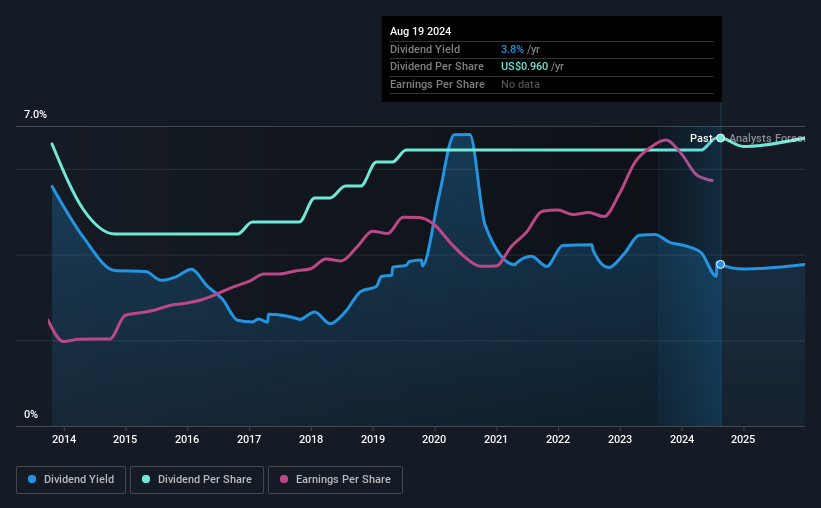- United States
- /
- Banks
- /
- NasdaqGS:FFBC
First Financial Bancorp (NASDAQ:FFBC) Is Increasing Its Dividend To $0.24
First Financial Bancorp.'s (NASDAQ:FFBC) dividend will be increasing from last year's payment of the same period to $0.24 on 16th of September. This makes the dividend yield about the same as the industry average at 3.8%.
View our latest analysis for First Financial Bancorp
First Financial Bancorp's Dividend Forecasted To Be Well Covered By Earnings
We like to see a healthy dividend yield, but that is only helpful to us if the payment can continue.
First Financial Bancorp has established itself as a dividend paying company with over 10 years history of distributing earnings to shareholders. Taking data from its last earnings report, calculating for the company's payout ratio shows 37%, which means that First Financial Bancorp would be able to pay its last dividend without pressure on the balance sheet.
Over the next year, EPS is forecast to expand by 1.5%. If the dividend continues on this path, the future payout ratio could be 40% by next year, which we think can be pretty sustainable going forward.

Dividend Volatility
While the company has been paying a dividend for a long time, it has cut the dividend at least once in the last 10 years. The annual payment during the last 10 years was $0.94 in 2014, and the most recent fiscal year payment was $0.96. Dividend payments have been growing, but very slowly over the period. The dividend has seen some fluctuations in the past, so even though the dividend was raised this year, we should remember that it has been cut in the past.
The Dividend's Growth Prospects Are Limited
With a relatively unstable dividend, it's even more important to evaluate if earnings per share is growing, which could point to a growing dividend in the future. However, First Financial Bancorp has only grown its earnings per share at 3.0% per annum over the past five years. Earnings growth is slow, but on the plus side, the dividend payout ratio is low and dividends could grow faster than earnings, if the company decides to increase its payout ratio.
Our Thoughts On First Financial Bancorp's Dividend
In summary, it's great to see that the company can raise the dividend and keep it in a sustainable range. While the payout ratios are a good sign, we are less enthusiastic about the company's dividend record. This looks like it could be a good dividend stock going forward, but we would note that the payout ratio has been at higher levels in the past so it could happen again.
Market movements attest to how highly valued a consistent dividend policy is compared to one which is more unpredictable. Meanwhile, despite the importance of dividend payments, they are not the only factors our readers should know when assessing a company. As an example, we've identified 2 warning signs for First Financial Bancorp that you should be aware of before investing. Looking for more high-yielding dividend ideas? Try our collection of strong dividend payers.
New: AI Stock Screener & Alerts
Our new AI Stock Screener scans the market every day to uncover opportunities.
• Dividend Powerhouses (3%+ Yield)
• Undervalued Small Caps with Insider Buying
• High growth Tech and AI Companies
Or build your own from over 50 metrics.
Have feedback on this article? Concerned about the content? Get in touch with us directly. Alternatively, email editorial-team (at) simplywallst.com.
This article by Simply Wall St is general in nature. We provide commentary based on historical data and analyst forecasts only using an unbiased methodology and our articles are not intended to be financial advice. It does not constitute a recommendation to buy or sell any stock, and does not take account of your objectives, or your financial situation. We aim to bring you long-term focused analysis driven by fundamental data. Note that our analysis may not factor in the latest price-sensitive company announcements or qualitative material. Simply Wall St has no position in any stocks mentioned.
About NasdaqGS:FFBC
First Financial Bancorp
Operates as the bank holding company for First Financial Bank that provides commercial banking and related services to individuals and businesses in Ohio, Indiana, Kentucky, and Illinois.
Flawless balance sheet, undervalued and pays a dividend.
Similar Companies
Market Insights
Community Narratives




